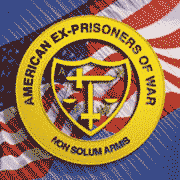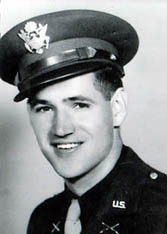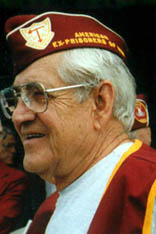
Established April 14, 1942
 |
American Ex-Prisoners of War
A not-for-profit, Congressionally-chartered veterans’ service organization advocating for former prisoners of war and their families.
Established April 14, 1942 |


Lawrance Naab 1943
|

Lawrence Naab 1996
|
|
| Last Name | First Name, Middle Init. | Nickname |
| Spouse | City | State, Zip |
| Conflict — Theatre | Branch of Service | Unit: |
| Military Job | Date Captured | Where Captured |
| Age at Capture | Time Interned | Camps |
| Date Liberated | Medals Received | |
| After the War ... | ||
"Upon capture, what was left of the 351st Regiment (Company G) were marched throughout the night then transported by railroad boxcar at length to Stalag VII-A near Mooseburg, Germany. It was a very large POW camp holding about 40,000 men of many nationalities. We were taken to a heavily guarded area. Being a new POW I had thought we would be given something to eat after 4-5 days without food. How wrong I was.
"Each POW was given an overcoat, one blanket and a sack full of straw. The bunks were three high with wooden slats to put the straw on. Probably one thing I missed most was a toothbrush; I took a piece of my blanket, wet it and used salt to brush with."
Dad's memories of those first two months were sketchy. However, after his transfer in December, 1944 those memories are much more vivid.
"By noon on December 26, 1944 we were marched about 3 miles to a railroad yard. The boxcar had been especially arranged for the POWs with about half being available for the prisoners. There was one stool and straw on the floor. I am not sure how many were crammed into that car but it was about 25. After we were in they nailed wire from the front of one side of the car door to the open side of the other. One door was open and one shut. Three guards used the rest of the car.
"On January 1, 1945 the train stopped and we were loaded on trucks going to our next POW camp. The new camp was Oflag 64 near Schubin. Poland. On the morning of January 20, 1945 we learned definitely that we were going to be evacuated from Schubin. On January 21st we left Oflag 64 in a long column of twos. The temperature was just above zero.
"The Germans had made no plans for feeding us, so it was whatever we were able to carry of the Red Cross Food Parcels we had when we left. It was dark when we arrived at a large farm complex, and the Germans told us to sleep wherever we could find a place to lay. I went into the barn that was full of sheep. There were some feeding stalls so I just got in one of these. Early the next morning the Germans were everywhere with fixed bayonets jabbing into everything they thought we might use to hide. Several hid in a haystack but the Germans fired their machine guns. I don't know how many were killed or how many escaped, but our numbers were less and less over the next 6 days.
"At one point I couldn't walk anymore. My feet were nearly frozen, and I had been hit in the back with a rifle butt. Eventually the men arrived at a rail yard in the city of Settin, Germany. More and more men kept coming in and soon there were about 120 of us. They herded us into the two rail cars. It was so crowded that we had to take turns sitting and standing. We could take that but there was only one bucket for relieving ourselves. Dysentery was a problem, and sometimes lying down it would come down on us. After several days the men arrived at the Berlin rail yards.
"Many times bombs dropped near us. We had now been about 6 days in this boxcar without food. Water wasn't a problem, as the German guards would fill a pail with snow for us. After sitting in those yards for 3 days we finally began to move. The train stopped at the city of Luckenwalde. The prisoners were then transferred to Stalag III-A.
"There were no American Red Cross food parcels in the supply house, but a shipment that came in assigned to the American Senior Officer was changed by the French to read French Senior Officer. The Germans had put the French in charge of parcel distribution. The French offered to barter the parcels to us for anything of value that we might have. I was offered a can of Spam for my bible. No way, even though I knew my weight was now down to about 100 pounds.
"Another food problem we had was that there was a steady flow of POWs from other camps that were being forced marched to Stalag III-A. The camp, at the end, held over 50,000 POWs. It was designed for 12,000. The weather was cold. We started burning the slats in our bunks to keep a little warmer.
"April 14, 1945 was the day of our so-called liberation by the Russian Army. The Russian Army took all the food from the camp as they passed through on their way to Berlin. We were left with nothing to eat. They told the Senior American officer that for our own safety we would all be kept in the compound. If anyone tried to escape they would be shot. He was also told that we were soon to be evacuated to the Port of Odessa on the Black Sea to be released to the American government there.
"On May 20, 1945 the exchange of hostages between the American and Russian governments was completed. I will never forget May 22, 1945 as that was the day that I had a hot shower, had my head shaved to get rid of the lice and a hot meal of strained vegetables. I weighted just over 100 pounds. The next morning we were put aboard a C-47 transport plane to Nancy, France."
Dad passed away on March 15, 1998 but thanks to his many memories and his willingness to share those with future generations we are all much richer.